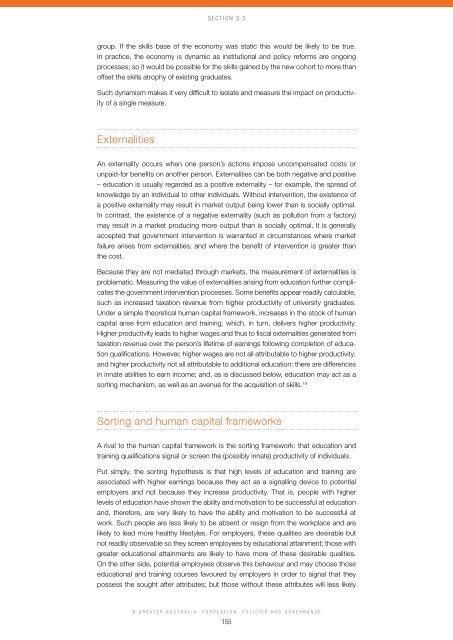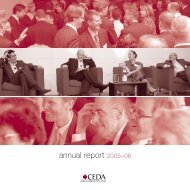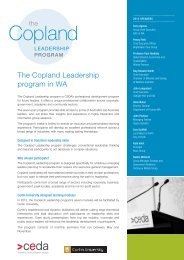A Greater Australia: Population, policies and governance - CEDA
A Greater Australia: Population, policies and governance - CEDA
A Greater Australia: Population, policies and governance - CEDA
- No tags were found...
Create successful ePaper yourself
Turn your PDF publications into a flip-book with our unique Google optimized e-Paper software.
Section 3.3group. If the skills base of the economy was static this would be likely to be true.In practice, the economy is dynamic as institutional <strong>and</strong> policy reforms are ongoingprocesses; so it would be possible for the skills gained by the new cohort to more thanoffset the skills atrophy of existing graduates.Such dynamism makes it very difficult to isolate <strong>and</strong> measure the impact on productivityof a single measure.ExternalitiesAn externality occurs when one person’s actions impose uncompensated costs orunpaid-for benefits on another person. Externalities can be both negative <strong>and</strong> positive– education is usually regarded as a positive externality – for example, the spread ofknowledge by an individual to other individuals. Without intervention, the existence ofa positive externality may result in market output being lower than is socially optimal.In contrast, the existence of a negative externality (such as pollution from a factory)may result in a market producing more output than is socially optimal. It is generallyaccepted that government intervention is warranted in circumstances where marketfailure arises from externalities, <strong>and</strong> where the benefit of intervention is greater thanthe cost.Because they are not mediated through markets, the measurement of externalities isproblematic. Measuring the value of externalities arising from education further complicatesthe government intervention processes. Some benefits appear readily calculable,such as increased taxation revenue from higher productivity of university graduates.Under a simple theoretical human capital framework, increases in the stock of humancapital arise from education <strong>and</strong> training, which, in turn, delivers higher productivity.Higher productivity leads to higher wages <strong>and</strong> thus to fiscal externalities generated fromtaxation revenue over the person’s lifetime of earnings following completion of educationqualifications. However, higher wages are not all attributable to higher productivity;<strong>and</strong> higher productivity not all attributable to additional education: there are differencesin innate abilities to earn income; <strong>and</strong>, as is discussed below, education may act as asorting mechanism, as well as an avenue for the acquisition of skills. 19Sorting <strong>and</strong> human capital frameworksA rival to the human capital framework is the sorting framework: that education <strong>and</strong>training qualifications signal or screen the (possibly innate) productivity of individuals.Put simply, the sorting hypothesis is that high levels of education <strong>and</strong> training areassociated with higher earnings because they act as a signalling device to potentialemployers <strong>and</strong> not because they increase productivity. That is, people with higherlevels of education have shown the ability <strong>and</strong> motivation to be successful at education<strong>and</strong>, therefore, are very likely to have the ability <strong>and</strong> motivation to be successful atwork. Such people are less likely to be absent or resign from the workplace <strong>and</strong> arelikely to lead more healthy lifestyles. For employers, these qualities are desirable butnot readily observable so they screen employees by educational attainment; those withgreater educational attainments are likely to have more of these desirable qualities.On the other side, potential employees observe this behaviour <strong>and</strong> may choose thoseeducational <strong>and</strong> training courses favoured by employers in order to signal that theypossess the sought after attributes; but those without these attributes will less likelyA <strong>Greater</strong> <strong>Australia</strong>: <strong>Population</strong>, Policies <strong>and</strong> Governance155





